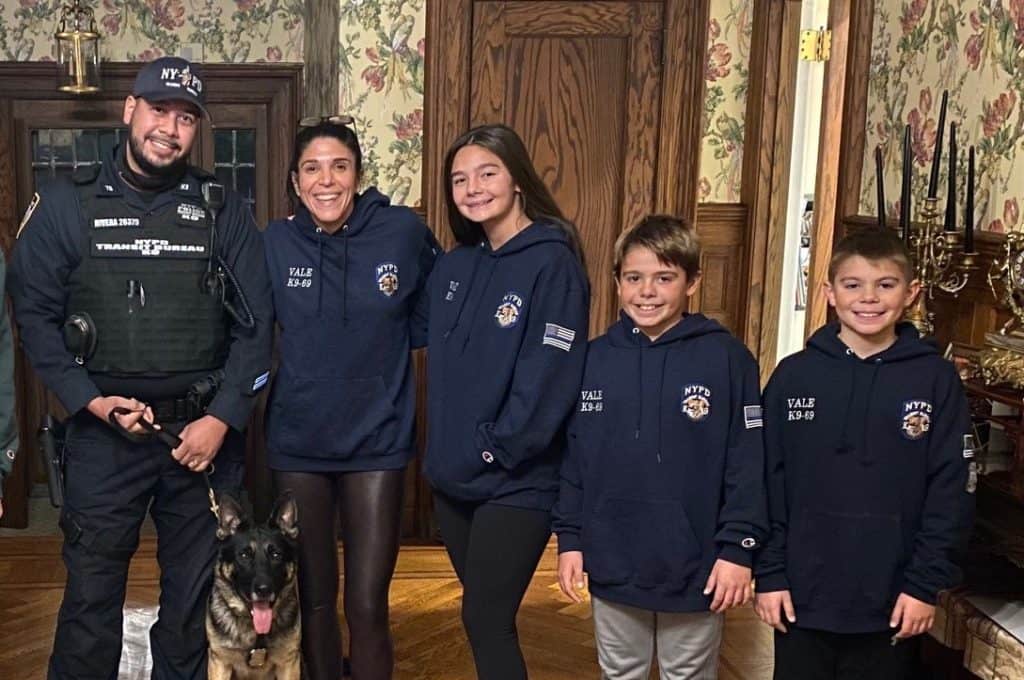
By Dan Murphy
Many of us in Westchester have recently learned about the story of NYPD Detective George Caccavale, who was shot and killed in 1976, while working a second job at a check cashing store. Detective Caccavale was escorting a cash delivery to the store when three armed men shot and killed him, leaving the 11-year NYC Transit cop with a widow, and a nine-year old son and infant daughter without a dad.
In 2019, the NYPD named one of their new K-9 dogs Vale, in memory of Det. Caccavale. Cacavale’s daughter, created a sweatshirt in honor of Vale and her father. She explained that originally, 13 sweatshirts were made for family and the family of the officer who was partnered with Vale after the K-9 graduation ceremony. That number was increased to 150 after friends and neighbors in Pelham asked for them as well.
The sweatshirts were used to raise funds for the Detectives’ Endowment Association, the Widows and Children Fund, and the Retired Police K9 Foundation. One hundred percent of the proceeds were donated and the Caccavale family matched the amount.
A number of the sweatshirts, which feature four patches, for the K-9 dog Vale, in memory of Detective Caccavale, an NYPD patch, and a Thin Blue Line Flag patch, were worn by employees in the Pelham School District.
Carla Caccavale, who has children in the Pelham Schools, created and sold the sweatshirts in 2019, months before the George Floyd killing shocked the country and completely changed the dialogue over Police and people of color.
Now, one year after the sweatshirts were sold, a controversy has erupted in Pelham that has been covered by media outlets around the globe after the Pelham Schools Superintendent Dr. Cheryl Champ banned the sweatshirts from school property after complaints from students and parents over one patch on the sweatshirt, a Thin Blue Line Flag.
“It is more important than ever for staff to demonstrate political neutrality so that we can assist our students in maintaining an environment of fair and balanced civil discourse. I want to unequivocally state that we support our police and their families,” Superintendent Champ said. “At the same time, we must be mindful of ensuring that our schools are places that are physically and emotionally safe for our students. Like many symbols whose meaning has been co-opted over time, the thin blue line flag has increasingly been perceived by students to be threatening in nature, causing them to feel unsafe within our schools.”
Caccavale said that she was stunned that the sweatshirt could be perceived as “a symbol of white supremacy,” and has explained repeatedly what the sweatshirts were all about. “I had the purest of intentions. As I explained in my comments before the Board of Education, as educators you should have taken all of the symbols on the shirt in the context for which they were intended.”
“I’m not into politics at all … This is not Black Lives Matter versus police. This was never the intent when we created the sweatshirt. I’m not here to defend bad cops, I’m here to honor the good ones. I am all for necessary steps needed for police reform while simultaneously honoring hero cops. There was no agenda when this began other than honoring my father,” said Caccavale, who also told the School Board that if there were concerns about the Thin Blue Line Flag on the sweatshirt, “this would have been a teachable moment instead of dividing our Town.”
Caccavale also questions the immediacy in which her sweatshirts – and all blue line apparel – was barred from the district in comparison to shirts that had a Black Power symbol and the names of those killed by police with the word vote on it were allowed to remain in the district until after election day.
Paul DiGiacomo, president of the New York Detectives’ Endowment Association wrote to the Pelham Board of Education. “The men who shot and killed him (Caccavale) were later discovered to be members of the Black Liberation Army. They were caught, convicted, and sentenced to lengthy prison terms. But no amount of time in prison could ever bring Det. Caccavale back to his grieving family.”
He went on to take sharp exception to “We are in receipt of, and absolutely outraged by, your letters outlining your decision to ban any graphic or logo that honors the profession of policing or memorializes members of the service who have been killed in the line of duty. These are personal and deeply felt family memorials that you’ve somehow turned into ‘threatening political speech.’”
“At the same time,” Mr. DiGiacomo continued, “you’ve decided that the 1960s symbol of a ‘Black Power’ fist is not political, and that listing the names of people who died during the commission of a crime, being questioned by police, or while resisting arrest isn’t political, either, and are permissible to wear. For the record, you are not ‘protecting’ students by perverting views about policing in America or turning your students into cop-haters.”
The New York Times story on this topic included comments from school safety coordinator Ralph DeMasi, who had worn the sweatshirt in school before it was banned, a decision that DeMasi said “made a lot of people upset here, obviously. Clearly a directive was given. One side followed it, while the other side was allowed to express their views.”
An alternative view was printed by the Times from Solange Hansen, a black and Latina women who lives in Pelham. “People are taking this hard line. All of a sudden, overnight, you see these blue line flags on people’s lawns. You see them in people’s businesses. And that makes it really hard for the people of color.”
A Pelham High School senior, Nadine LeeSang, wrote a letter to the student newspaper supporting the school districts decision and that the Thin Blue Line flag “ reminded students of color of “racist experiences they have had” with law enforcement. Nobody was really talking about how students felt uncomfortable, and it was kind of being dismissed.” The letter was signed by LeeSang, a student of color, and 15 other Pelham high school students.
Superintendent Champ apologized at a recent school board meeting, “for not enforcing this policy evenly at its outset, which I recognize created an appearance of being one-sided.”
But State Senator Alessandra Biaggi, who represents Pelham, wrote a letter in support of the Superintendents actions. “While I understand that members of our community have differing opinions and perspectives, it is paramount that we find a way to have a respectful and honest community conversation regarding the decision.”
Senator Biaggi asked for all in Pelham to have a respectful and honest conversation. We have not seen a lot of respect, or an honest conversation, when it comes to the angry and hateful comments made against Carla Caccavale on social media. We would ask Sen. Biaggi to condemn those comments.
Sen. Biaggi continued, “I urge us all to take a moment to reflect on our response to this situation and how we can establish an environment for meaningful dialogue.” Members of the Pelham Police Department and other law enforcement agencies volunteered to come into the Pelham schools and have a dialogue with students and staff, to have that meaningful dialogue that Sen. Biaggi references.
Those attempts by law enforcement were rejected. “Why force that on our kids,” said Hansen to the New York Times. “If even one kid said, ‘I am afraid of that symbol,’ isn’t that enough?”
Finally, Senator Biaggi, who reminded those in Pelham that her grandfather Mario Biaggi was one of the most decorated NYPD officers in history and that “I can value their service and my grandfather’s legacy, and still acknowledge the deep pain and suffering that people of color have experienced, and continue to experience, in this country at the hands of law enforcement,” said “I want to be clear that making the Pelham community into a spectacle will not cultivate space to heal or grow. Anyone who does not want to communicate in good faith, and does not want to de-escalate the situation, should step aside.”
Many in Pelham agree with Biaggi and would like the media to go away and the community to return to normal. The question is how is that accomplished? Perhaps the first step would be for the Pelham community and our entire nation to understand that the actions of a daughter, who wanted to remember and recognize her father, and his service as a police officer should not be condemned.
“In our Town, they have dragged us through the mud,” said Carla Caccavale. “My family lives, breathes and honors the line of duty sacrifices of police officers like my father. This to me was not political, nor racial. Many talk about a symbol being co-opted, yet they have now done the same to this story. I don’t mind if someone disagrees with me, but to question my intention is unfathomable.”
The other irony in this story is that the same sweatshirts that were banned in the Pelham Schools are not being sold by the hundreds, with those in support of the Caccavale family, and in support of the thousands of police officer who serve their communities with dignity, wanting to buy one. They raised over $16,000 thus far for the aforementioned charities.
The link to the website to purchase ishttps://detective.itemorder.com/sale





